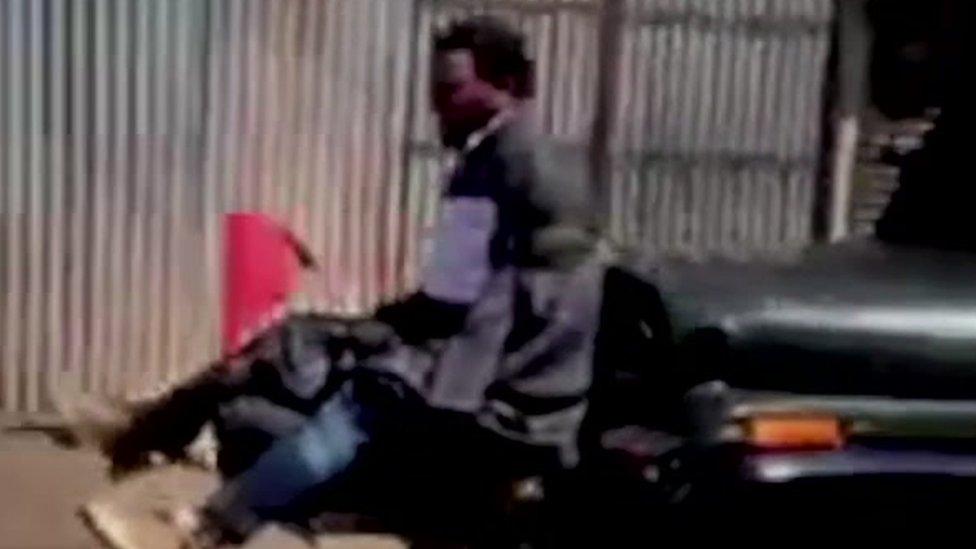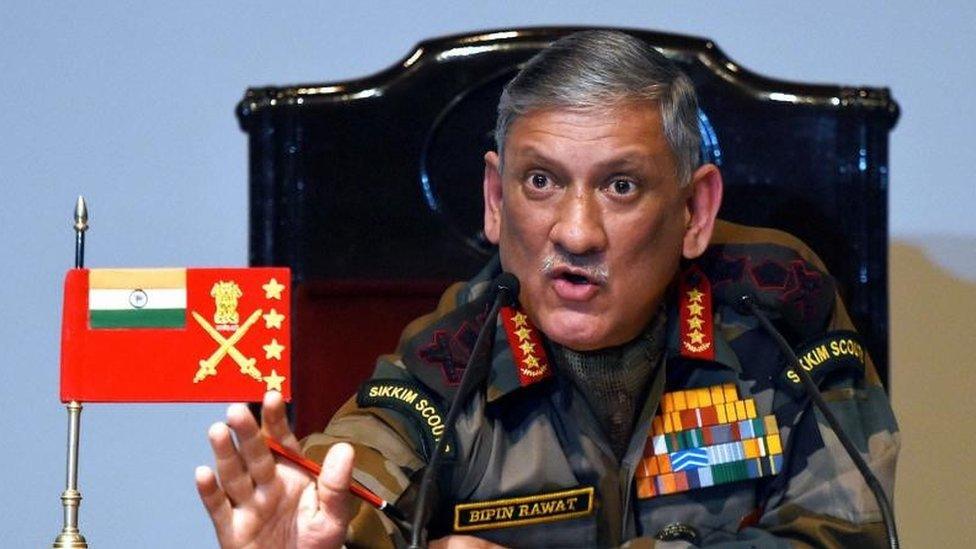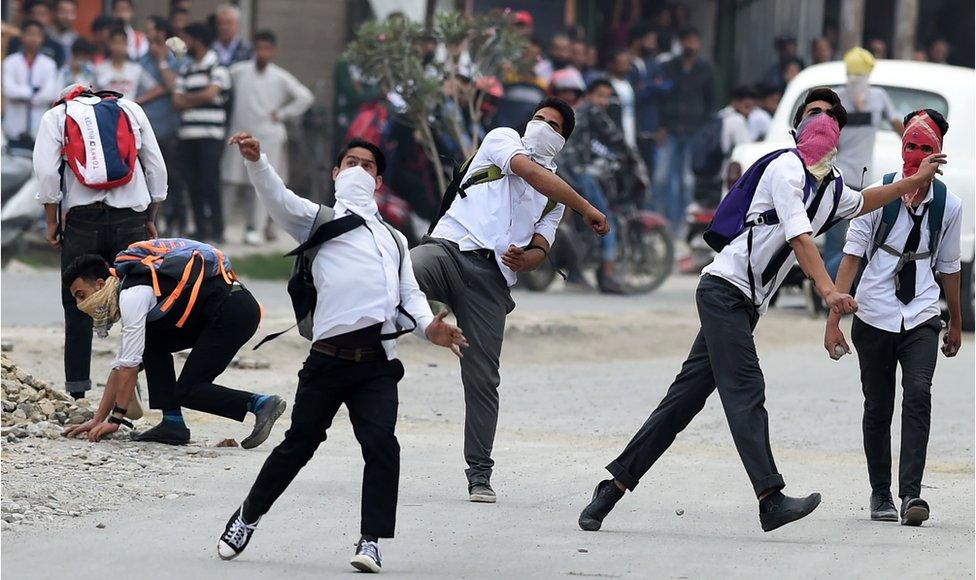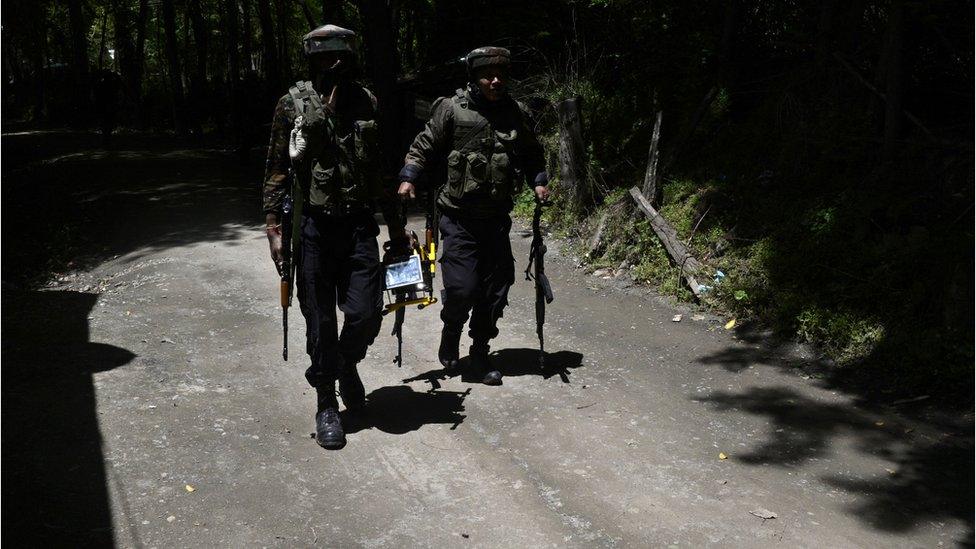Why Indian army defended Kashmir 'human shield' officer
- Published

Farooq Ahmad Dar says the army decision puts him in "danger"
If you want to know why India has courted international controversy by awarding a medal to an army officer who tied a civilian to the front of a jeep, you need to understand what is really happening in Indian-administered Kashmir.
What happened?
On 9 April, a Kashmiri man called Farooq Ahmed Dar was trussed to the spare tyre at the front of a jeep and driven on a five-hour journey through several villages at the head of an army convoy.
He had just voted in a by-election for the national parliament when he was picked up by an army patrol.
He was allegedly beaten before he was lashed to the vehicle with a sign saying "This is the fate that will befall stone throwers" pinned to his chest.
Kashmir is disputed between India and Pakistan and Indian-administered Kashmir has seen a fresh upsurge of violence in the past few months, with stone-throwing civilians pitted against military personnel.
Why was he seized?
The young army officer responsible, Major Leetul Gogoi, said Mr Dar was seized because he was directing a stone-throwing mob that was besieging a polling station - something denied by both Mr Dar and witnesses in the village.
A short history of India's Kashmir conflict

Indian army chief General Bipin Rawat has said the medal was given as a way of boosting the morale of young officers
Major Gogoi says he decided to tie Mr Dar to the jeep in a "fraction of a moment" and subsequently claimed it saved 12 lives. Despite the length of Mr Dar's ordeal, he argues it created "a window to move out of the area safely".
How did people react?
The incident was filmed and shared on social media, causing uproar in the Muslim-majority Kashmir Valley.
The use of Mr Dar as a human shield was criticised around the world. Amnesty International described it as "cruel, inhuman and degrading treatment amounting to torture".
The Indian government announced there would be an inquiry into the incident but on 22 May, before the inquiry had been completed, the army awarded Major Gogoi a commendation medal for, it said, his "sustained efforts during counter-insurgency operations".
What does the decision to award the medal tell us about the situation in Kashmir?
This incident shows just how difficult India is finding it to keep a lid on unrest in Kashmir.
Indian army sources have told the BBC that morale among soldiers stationed in the valley is very low. Many soldiers are becoming increasingly uncomfortable with their role in Kashmir, saying they fear they are effectively becoming an army of occupation.
Meanwhile, opposition to Indian rule in Kashmir appears to be deepening. That is reflected in the fact that Mr Dar was just one of 7% of eligible voters who actually voted in the by-election - the lowest turnout for decades.

Indian-administered Kashmir has seen a fresh upsurge of violence in the past few months
"We are fighting a legacy of political betrayal, infiltration, rigging in local elections, cynical politics, bad governance, vested interests, religion and regional divides," one senior army officer in Kashmir told my colleague, Soutik Biswas, a few weeks ago.
The officer acknowledged how difficult it is to operate in an environment where many people want the army to withdraw and said that, despite efforts to reach out to Kashmiris, the army remains unpopular.
How does the army justify the medal?
This weekend the chief of the Indian army, General Bipin Rawat, was clear why he wanted to honour Major Gogoi. He told the Press Trust of India (PTI) that the medal was given as a way of boosting the morale of young officers.
Gen Rawat served for many years in Kashmir and, like many Indians, believes much of the opposition to Indian rule is orchestrated by Pakistan. He described Major Gogoi's actions as an "innovation", arguing the armed forces have the right to self-defence and that by using Mr Dar as a human shield, he avoided the need to fire on the crowd.
"This is a proxy war and a proxy war is a dirty war. It is played in a dirty way. That is where innovation comes in. You fight a dirty war with innovations," he told PTI.
"People are throwing stones at us, people are throwing petrol bombs at us. If my men ask me what do we do, should I say, just wait and die? I will come with a nice coffin with a national flag and I will send your bodies home with honour. Is it what I am supposed to tell them as chief? I have to maintain the morale of my troops who are operating there," Gen Rawat said.
Will the conflict in Kashmir worsen?
That's certainly what many Kashmiris fear will happen. They say that the award of the medal to Major Gogoi has deepened opposition to Indian rule and to the presence of the army.

A large number of Indian troops are deployed in Kashmir
Gen Rawat actually appears to be keen to see an escalation in the conflict in Kashmir. "In fact," he told journalists, "I wish these people, instead of throwing stones at us, were firing weapons at us. Then I would have been happy. Then I could do what I [want to do]."
This is an extraordinary sentiment and a measure of just how difficult India is finding it to keep order in its most restive province.
His worry is that Kashmiris are losing their fear of his troops. If that happens, he says, the country is doomed.
"Adversaries must be afraid of you and at the same time your people must be afraid of you," says Gen Rawat. "We are a friendly army, but when we are called to restore law and order, people have to be afraid of us."